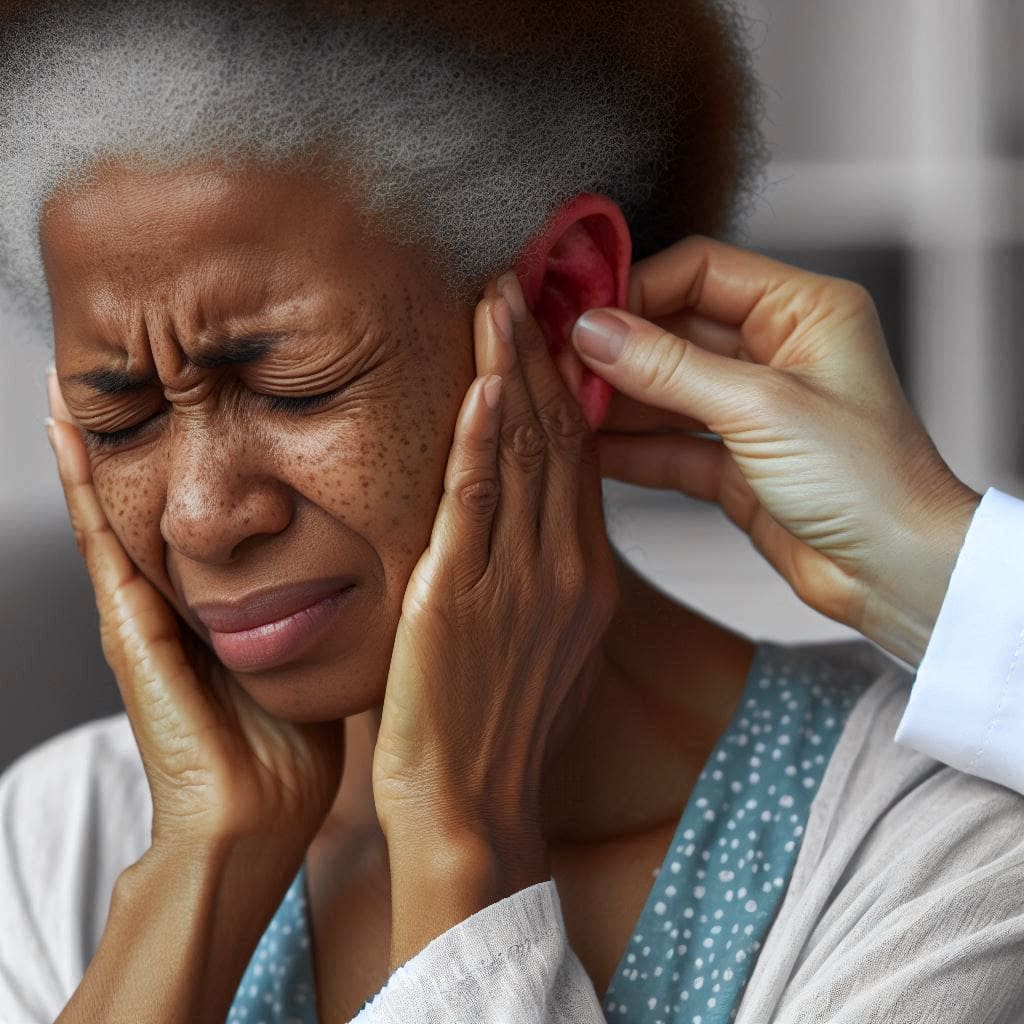
Earaches are no fun, especially for little ones. But fear not! Ear infections are a common problem, and there are ways to find relief and feel better quickly.
Here’s the lowdown on what causes ear infections, those pesky symptoms, and how to get back to feeling like yourself (or your little one!).
What is an Ear Infection?
An ear infection happens when the middle ear, the tiny space behind your eardrum, gets swollen and inflamed. This can be caused by bacteria or viruses, often from a cold or allergies which can cause pain and swelling. Ear infections are common, especially in children, but adults can get them too.
Causes of Ear Infections
- Colds and Flu: When you have a cold or the flu, germs can spread to your ears and cause an infection.
- Allergies: Allergies can cause your ear passages to swell and get blocked, leading to an infection.
- Earwax Build-Up: Too much earwax can block your ear and trap germs, causing an infection.
- Swimming: Water in your ears from swimming can lead to infections, especially if the water is dirty.
- Poor Hygiene: Not keeping your ears clean can allow germs to grow and cause infections.
Beyond the Usual Culprits: Less Common Causes of Ear Infections
We’ve explored how colds, allergies, and even swimming can lead to ear infections. But there are a few other unexpected things that can cause those pesky earaches:
- Clogged Eustachian Tubes: This tiny tube connects your middle ear to your nose and throat. When it gets blocked by allergies, a cold, or even changes in air pressure (like flying!), fluid can build up in your ear and lead to infection.
- Teething: Believe it or not, teething can irritate the Eustachian tube in babies, making them more prone to ear infections.
- Formula Feeding: While breastfeeding offers some protection against ear infections, formula-fed babies might have a slightly higher risk.
- Exposure to Secondhand Smoke: Secondhand smoke irritates the entire respiratory system, including the ears, making them more susceptible to infection.
- Objects in the Ear: This is more common in young children, but sticking anything in the ear, like cotton swabs or tiny toys, can scratch the eardrum and increase the risk of infection.
What are the Symptoms?
- Earache: This is usually the main sign, and it can be a throbbing or sharp pain.
- Fever: Feeling hot or having a temperature above 100.4°F (38°C) can be a sign of infection.
- Drainage: Fluid might leak from your ear, which can be clear, yellow, or bloody.
- Trouble Hearing: Your hearing might be muffled or feel off during an infection.
- Fussiness in Babies: Irritability and crying, especially when lying down, can be signs of an earache in babies who can’t tell you what’s wrong.
How to Find Relief:

If you suspect an ear infection, it’s important to see a doctor to get a proper diagnosis and treatment plan.
They might prescribe:
- Antibiotics: If it’s a bacterial infection, antibiotics can help fight the bacteria and clear it up.
- Pain relievers: Over-the-counter pain relievers like acetaminophen or ibuprofen can help ease the discomfort. (Always follow dosage instructions carefully, especially for children.)
- Ear drops: In some cases, ear drops might be prescribed to help reduce inflammation.
Home Remedies for Earache Comfort

While you wait to see a doctor, there are some things you can do at home to ease the pain:
- Warm compress: Soak a washcloth in warm water, wring it out, and hold it against your ear for 10-20 minutes. Repeat as needed.
- Keep Your Head Elevated: If you’re lying down, prop yourself up with pillows to help drain fluid from your ear.
- Over-the-counter pain relievers (for adults and following dosage instructions for children) can provide temporary relief.
- Stay Hydrated: Drink plenty of water to help your body fight the infection.
Soothing Strategies: More Home Remedies for Earache Relief
While waiting to see a doctor, here are some additional home remedies to bring comfort and ease that earache pain:
- Snuggle Up with a Steamer: Inhale warm steam from a humidifier or a hot shower to help loosen mucus and soothe congestion, which can sometimes ease ear pain.
- Garlic Power (for Adults Only): Some people find relief with placing a warmed clove of garlic (wrapped in a cloth) near the ear. Important Note: While this remedy is popular, consult your doctor before using garlic for earaches and never put anything directly in your ear canal. Remember: This remedy is not suitable for children or anyone with sensitive skin.
- Ginger Magic (for Adults Only): Ginger has anti-inflammatory properties that might help reduce earache discomfort. Try a warm ginger compress (made with grated ginger wrapped in a cloth) or sipping on ginger tea. Important Note: If you’re taking any medications, consult your doctor before using ginger, as it can interact with some meds.
- Gargle with Warm Salt Water: Mix half a teaspoon of table salt in a warm glass of water and gargle several times a day. This can help soothe a sore throat that might be contributing to ear pain.
- Comforting Distractions: Take your mind off the pain! Watch a funny movie, listen to calming music, or curl up with a good book.
- Sleep It Off: Rest allows your body to focus on healing. Catch up on some sleep in a comfortable, quiet position, preferably with your head elevated.
When to See a Doctor
- If the pain is very bad
- If the symptoms last more than a couple of days
- If fluid is coming out of the ear
- If you have trouble hearing
Preventing Ear Infections:
Here are some ways to help prevent ear infections:
- Frequent handwashing: This helps stop the spread of germs that can cause infections.
- Avoid secondhand smoke: Smoking irritates the ears and increases the risk of infection.
- Vaccinations: Keep up with recommended childhood vaccinations, as some can help prevent ear infections.
- Dry Your Ears After Swimming: Make sure to dry your ears well after swimming to prevent infections.
- Treat Allergies: Manage your allergies to prevent ear infections.
- Stay Healthy: Keep your immune system strong by eating well, exercising, and getting enough sleep.
- Breastfeeding: Breastfeeding can offer some protection against ear infections in babies.
Conclusion
Ear infections are common, but they are treatable. Don’t hesitate to see a doctor if you or your child experiences an earache, especially with a fever or drainage. With prompt treatment and some home remedies, you can find relief and be back to your happy, healthy self in no time!
Disclaimer: The home remedies are for temporary relief and should not be a substitute for professional medical advice. If your earache is severe, persistent, or accompanied by a fever, drainage, or hearing loss, see a doctor right away.



